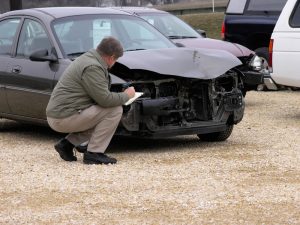Being involved in a car accident can be a distressing experience, and it’s only natural to feel overwhelmed or unsure about what to do next. However, speaking with the insurance adjuster is often necessary after a Florida car accident. The insurance adjuster will assess the damages and determine the settlement amount. It is imperative to approach this conversation cautiously and be mindful of what you say. Remember that the insurance adjuster is not on your side and may try to minimize your claim. How you navigate these conversations can make or break your compensation claim. As such, contacting a Florida car accident attorney near you for guidance and support is in your best interest.
Understanding the Role of the Insurance Adjuster
Insurance adjusters play a critical role in the claims process after a car accident. They are insurance company representatives, so it makes sense that their primary goal is to protect the company’s bottom line. While they may seem friendly and sympathetic, what most claimants don’t understand is that their interests are not aligned with theirs. Their goal is to minimize payouts and settle claims for as little as possible. As such, they may employ various tactics to reduce or deny your claim. Their tactics are not always obvious, making it even more important to recognize how they operate.
One common strategy is using your lack of legal knowledge against you. Adjusters may pressure you into accepting a quick settlement offer, claiming it’s the best you can get or that delays can jeopardize your claim. They might also subtly discourage you from consulting a lawyer, implying it will complicate the process or delay your payment. However, this advice serves their interests, not yours.
Another tactic involves cherry-picking evidence that benefits their side. For example, they might focus on a minor inconsistency in your account of the accident or downplay damage estimates provided by your repair shop. They can even send their own “experts” to assess property damage, potentially undervaluing the extent of your losses.
Capitalizing on stress and confusion after an accident is a frequent strategy. Adjusters understand that you may feel overwhelmed and financially strained, making you more likely to settle quickly. Given these tactics, consulting an experienced Florida car accident lawyer is essential. Your lawyer can counteract these strategies, protect your rights, and ensure fair compensation.
Your Rights When Speaking to an Insurance Adjuster
When speaking to an insurance adjuster, it is imperative to understand your rights and exercise them to protect your best interests. Here are some key rights you should be aware of:
- You are not legally obligated to provide a statement immediately: You have the right to take your time and gather all necessary information before providing a statement to the insurance adjuster. Always consult with a Florida car accident attorney before speaking to the adjuster.
- You have the right to consult with a lawyer before speaking to the adjuster: Seeking legal counsel is critical to ensuring that your rights are protected and that you clearly understand the claims process.
- Understand your policy and the claims process: Before discussing your policy with the adjuster, review your insurance policy and familiarize yourself with the claims process. It will help handle the conversation more confidently and avoid any potential pitfalls.
By being aware of these rights, you can approach conversations with insurance adjusters more assertively and with a better understanding of the situation. Often, it’s best not to speak to the adjuster and to hire an attorney who will talk to them on your behalf.
What to Say (And Not Say) to an Insurance Adjuster
When speaking to an insurance adjuster, choose your words carefully. Here are some tips on what to say and what not to say:
What to say:
- Provide only essential information: Start by providing the adjuster with your name, address, and the date and time of the accident. Avoid going into unnecessary details or speculating about fault.
- Stick to the facts: When discussing the accident, stick to the facts without embellishment or speculation. Avoid giving subjective opinions or making guesses about what happened.
- Inform them about seeking medical treatment: If you have sought or plan to seek medical treatment for any injuries sustained in the accident, inform the adjuster. It helps establish the seriousness of your injuries and the need for compensation.
What not to say:
- Admit fault or apologize: Avoid admitting fault or apologizing for the accident. Even a simple apology can be used against you as an admission of guilt.
- Discuss definitive statements about injuries or the accident: Refrain from making definitive statements about your injuries or the accident without consulting medical professionals or legal advice. Before discussing them with the adjuster, you must clearly understand your injuries and their long-term impact. You want to ensure you reach maximum medical improvement before negotiating your claim.
- Discuss settlement amounts or accept early offers: Avoid discussing settlement amounts or accepting early offers without fully understanding the value of your claim. Early offers from insurance companies are often lower than the actual value of the damages.
Remember to keep your answers brief and to the point. Do not provide unnecessary information or elaborate on details that are not required. The goal is to provide the adjuster with the necessary information while protecting your rights and maximizing your compensation.
Why Insurance Adjusters Ask for a Recorded Statement
Insurance adjusters often request recorded statements from claimants. Before agreeing to provide one, you should understand why and how these statements can be used against you.
The primary purpose of a recorded statement is for the insurance adjuster to gather information that can be used to minimize the value of your claim. Adjusters are trained to ask questions in a way that may lead you to provide answers that can be used against you later on.
Here are a few reasons why insurance adjusters ask for recorded statements:
- Documenting your version of events: Adjusters want to document your side of the story regarding the accident. However, they may ask questions in a way that can elicit answers that are not in your favor.
- Assessing liability and fault: Adjusters will try to gather information to assess liability and determine fault for the accident. They may use your recorded statement to argue that you were partially or fully responsible for the accident, which can reduce their liability.
- Denying or minimizing claims: Adjusters may use your recorded statement to dispute the severity of your injuries or argue that they were pre-existing conditions. Such information can be used as a basis for denying or minimizing your claim.
Given these risks, it is generally advised to politely decline recorded statements and refer the adjuster to your attorney. A Florida car accident lawyer can guide you through the claims process and ensure you do not unknowingly provide information that can be used against you.
How a Florida Car Accident Lawyer Can Help
Navigating conversations with insurance adjusters can be overwhelming, especially when dealing with the aftermath of a car accident. Consulting with a Florida car accident lawyer can provide invaluable assistance and protect your rights. Here are some ways a lawyer can help:
Handling Communications with the Insurance Company
A lawyer can act as your representative and handle all communications with the insurance adjuster. It ensures your rights are protected and you do not unknowingly say something that may harm your claim.
Preventing Missteps that Can Harm the Claim
Lawyers have experience dealing with insurance companies and understand their tactics to minimize payouts. They can guide you on what to say, what not to say, and how to handle conversations with adjusters to protect your claim.
Negotiating for a Fair Settlement
A skilled Florida car accident attorney can negotiate with the insurance company on your behalf to secure a fair settlement that reflects the true value of your damages. They will gather evidence, medical documentation, and expert testimony to strengthen your claim and maximize compensation.
Providing Peace of Mind
Having a legal advocate handle complex discussions with insurance adjusters can alleviate stress and provide peace of mind. You can focus on your recovery while knowing that an experienced professional is handling your claim.
Countless car accident victims in Florida have benefited from the legal representation of skilled lawyers. Attorneys have successfully increased settlements, ensuring that victims receive the compensation they deserve, no matter which tactics an insurance adjuster relies on to devalue or deny the claim.
Common Pitfalls to Avoid When Dealing with Insurance Adjusters
When dealing with insurance adjusters, there are some common pitfalls that claimants should avoid. By steering clear of these mistakes, you can strengthen your claim and increase the chances of receiving fair compensation. Here are a few frequent errors claimants make:
- Providing too much information or speculating about fault: Stick to the facts when discussing the accident and avoid providing unnecessary information or speculating about the fault. Your Florida car accident attorney can help through the conversation effectively or speak with them on your behalf.
- Accepting quick, low-ball settlement offers: Insurance companies may offer quick settlement amounts significantly lower than your claim’s value. Always carefully review the claim’s full value with your attorney before accepting any offers.
- Failing to document injuries and expenses thoroughly: Documenting your injuries and the costs associated with your recovery is essential. Keep a record of medical bills, prescription costs, therapy expenses, and any other relevant documentation to support your claim.
Each of these mistakes can reduce the potential compensation amount that you can receive. Work with a Florida car accident lawyer to avoid these pitfalls and protect your rights.
The Role of No-Fault Laws in Florida Car Accidents
Florida’s unique no-fault car insurance laws significantly impact how car accident claims are handled. These laws are designed to streamline the claims process and reduce the burden on the court system, but they can also create confusion for drivers unfamiliar with their implications.
Under Florida’s no-fault system, drivers must turn to their insurance company for compensation after an accident, regardless of who was at fault. It is made possible through Personal Injury Protection (PIP) insurance, which is mandatory for all Florida drivers. PIP coverage provides up to $10,000 for medical expenses, lost earnings, and certain out-of-pocket costs related to the accident.
The no-fault approach is intended to provide quicker payouts for injured parties without the need to establish fault, allowing them to receive immediate medical treatment and financial support.
How No-Fault Laws Affect Liability Claims
Although PIP covers immediate expenses, it does not eliminate the ability to pursue a claim against an at-fault driver for damages exceeding the PIP limits. For instance, if your injuries result in long-term medical needs or significant pain and suffering, you can file a lawsuit to recover additional compensation. However, this process requires substantial evidence to meet the serious injury threshold.
Protect Your Rights by Consulting a Florida Car Accident Lawyer Today
Dealing with insurance adjusters after a car accident can be a daunting task. Unfortunately, a conversation with the adjuster can play a substantial role in determining the outcome of your claim; approach these discussions carefully. By understanding the role of the insurance adjuster and your rights, you can protect yourself and ensure you receive fair compensation for your damages.
Consulting with a Florida car accident lawyer is highly recommended to manage conversations with the insurance company effectively. They will ensure you do not say anything that can harm your case. Your attorney can provide guidance, handle communications with the adjusters, and negotiate on your behalf, increasing your chances of receiving a fair settlement.
If you have been involved in a car accident in Florida, don’t hesitate to contact a Florida car accident lawyer for a free consultation. They can provide the support and representation you need to protect your rights and maximize your compensation. Remember, don’t go through the claims process alone – reach out to Frankl Kominsky Injury Lawyers to ensure your best interests are represented. Contact a seasoned Florida personal injury attorney near you today.
 South Florida Injury Attorneys Blog
South Florida Injury Attorneys Blog





